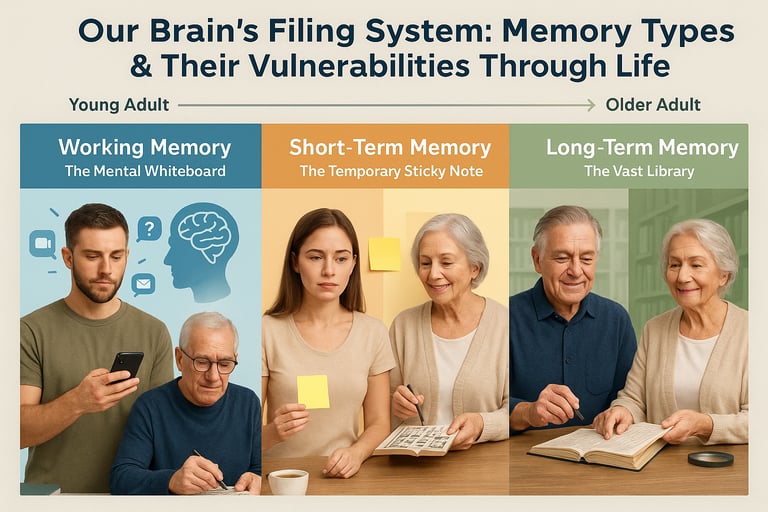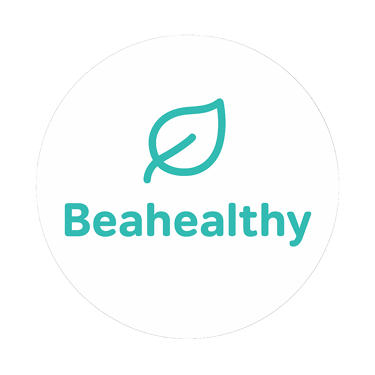Forgetfulness at 20 vs. 80: Why Memory Problems Differ Across Ages & What Helps
Uncover why memory problems vary from youth to old age. Learn actionable strategies & cutting-edge treatments to sharpen your mind. Explore solutions for cognitive decline.
8/8/20256 min read


The Shifting Sands of Forgetfulness: Grasping Forgetfulness Throughout a Lifetime
Ever walked into a room and suddenly had no idea why you were there? Or attempted to recall a friend's familiar name, only to have it pop into your head hours later? Such fleeting failures of memory are normal, typically harmless. But what if those failures begin to occur with increasing frequency, increasing disruptiveness? When does an innocent forgetfulness signal something more, especially as we navigate the different stages of life?
Memory isn't a static entity; it's a dynamic, intricate system that changes with age, influenced by everything from our daily habits to our underlying health. From the rapidly developing brains of children to the seasoned minds of older adults, memory problems manifest uniquely, each with its own set of challenges and potential solutions. Understanding these nuances is the first step toward safeguarding one of our most precious cognitive assets.
Key Points
Memory issues are not the exclusive prerogative of old age but may occur in children, young adults, and middle age for diverse reasons.
The impact of memory issues extends beyond forgetfulness and encroaches on daily life, emotional well-being, and interpersonal relationships.
The majority of memory issues are either curable or manageable through a combination of medical intervention, lifestyle modification, and cognitive strategies.
Early identification and proactive interventions are instrumental to ensure cognitive well-being at any age.
Memory's Nuances: It's Not Just Forgetting a Name
When we talk about memory problems, it's not difficult to imagine an older adult with severe cognitive impairment. The reality, though, is far more nuanced. Memory problems can occur at any point during the lifespan, with each one demanding a unique approach to understanding and treatment.
The Developing Brain: Memory in Children and Young Adults
Look back at your school years. Have you ever found it hard to recall facts for a test, even though you had studied? For kids and young adults, memory issues are not usually about 'forgetting' memories but about having trouble with attention, organization, and processing information effectively. Disorders such as Attention. Deficit .Hyperactivity. Disorder (ADHD) can really affect working memory and retrieval, causing learning and everyday activities to become more difficult.
Stress, sleep deprivation, and even nutritional deficiencies can also play an important role. A student pulling all-nighters can experience 'brain fog' that impairs his,her ability to memorize, while a child under intense academic pressure can exhibit forgetfulness as a manifestation of anxiety. These are typically reversible and transient with lifestyle changes.
Midlife's Muddle: Memory Problems in Adulthood
Ah, midlife. Often a period of peak career pressures, family responsibilities, and, for many people, the first noticeable signs of age related memory loss. This does not necessarily herald impending drastic cognitive dysfunction, but rather is often a normal part of aging. Be sure, you might find yourself searching for words more often, or longer to recall names. Hormonal shifts, particularly in women experiencing perimenopause or menopause, can induce a state commonly known as 'brain fog.'
Chronic stress, sleepless nights, and the cumulative effect of an unhealthy lifestyle can also accelerate these subtle changes. While generally benign, midlife is a critical period to practice brain healthy habits that will protect cognitive function down the road. It's a question of clearing the path for a sharper tomorrow.
The Golden Years: Managing Memory in Older Adults
For most, the most disturbing memory problems occur late in life. While some cognitive slowing is a natural accompaniment of aging just as a computer may slow after a decade of use, say severe and progressive memory loss is not. It is here that the Dementia conditions, like Alzheimer's Disease, become more directly implicated. Alzheimer's, for instance, entails the progressive deterioration of brain cells, particularly in areas of the brain instrumental to memory, i.e., the hippocampus.
It's essential to differentiate between normal age related memory loss (e.g., occasionally forgetting where you've put your keys) and more serious symptoms that interfere with daily life (e.g., frequent getting lost in familiar places, trouble with basic math). When memory issues begin to interfere with independence or safety, it's a reason for prompt medical attention.
The Ripple Effect: Disadvantages of Memory Impairment
Regardless of age, severe memory problems cast a long shadow over many areas of life. It's more than just an inconvenience, as it can erode confidence and independence.
Impact on Daily Function and Independence
Picture having trouble remembering to take your medication, or not recalling how to use a common appliance. In older people, this can lead to a loss of independence, with a need for help with everyday activities. In younger people, it may take the form of an inability to do well in school or to fulfill responsibilities on the job. Productivity suffers, and everyday tasks seem overwhelming.
Emotional and Social Consequences
The affective influence of memory problems is profound. Frustration, anxiety, and even depression are common. Individuals will withdraw from social contact to avoid embarrassing forgetfulness, thereby becoming isolated. Family relationships can be impaired as loved ones cannot adjust to the changes, demonstrating the significant human consequence of these intellectual alterations.
"Memory is the diary that we all carry about with us." – Oscar Wilde. What do we do when pages start to tear, or chapters are lost?
Turning the Tide: Treatment and Management Strategies
The good news is that for the majority of memory problems, particularly those not associated with advanced neurodegenerative disorders, there are helpful strategies and cognitive decline treatments to try. Even in disorders like Alzheimer's, early intervention and management can improve quality of life.
Medical and Therapeutic Strategies
For certain conditions, prescription medication may be utilized to manage symptoms or retard progression. For instance, Alzheimer's are typically managed using cholinesterase inhibitors. In addition to medication, CBT or Cognitive Behavioral Therapy can be utilized to allow the individual to cope with the emotional impact of the memory alteration, and cognitive rehabilitation for managing strategies to improve memory function and activities of daily living.
Lifestyle as Medicine: Diet, Exercise, and Sleep
Much of the strength lies here, at any age. A Mediterranean-style diet, rich in fruits, vegetables, whole grains, and healthy fats, has been linked to better brain health. Exercise, even just walking regularly, enhances blood flow to the brain and promotes neuroplasticity ,the brain's ability to form new connections. And perhaps most critical, adequate, restful sleep is vital. The brain clears out metabolic waste products and consolidates memories during sleep.
Cognitive Training and Brain Stimulation
As with physical muscles, the brain benefits from exercise. Exercising the mind with new learning – a new language, an instrument, puzzles – can build cognitive reserve. Some new therapies, including transcranial magnetic stimulation (TMS), are also being studied for their potential to enhance cognitive function.
Your Action Plan
Ready to take charge of your cognitive health? Here are real steps you can take today:
Prioritize Quality Sleep: Have 7-9 hours of uninterrupted sleep each night. Establish a routine sleep habit.
Nourish Your Brain: Eat a diet rich in antioxidants, omega-3 fatty acids, and B vitamins. Think leafy greens, berries, fatty fish, and whole grains.
Stay Physically Active: Engage in at least 150 minutes of moderate-intensity aerobic exercise each week. Even short walks qualify.
Challenge Your Mind: Learn new things, read, play brain games, or engage in social activities that challenge your mind.
Manage Stress: Practice mindfulness, meditation, or time in nature to reduce chronic stress, a memory suppressor.
Stay Socially Engaged: Maintain good social relationships; social engagement keeps the mind active and prevents loneliness.
Seek Professional Advice: If memory problems are persistent or interfering with your daily life, consult a healthcare professional. Early detection is key.
Our Number One Choice for Cognitive Support
Lifestyle changes are crucial, but sometimes our brains need that little bit more. Based on ancient wisdom and modern science, we know the effect of precisely targeted nutrients. If you're interested in enhancing mental clarity, enhancing recall, and protecting brain health in the long run, find a quality supplement that offers total cognitive support. We highly recommend that you check out Advanced Memory Formula for yourself. It includes potent ingredients like ginkgo biloba, a well-known circulation and memory booster; phosphatidylserine (PS), a type of fat that can actually make your brain younger; and bacopa monnieri, an herb used for centuries to boost memory and brain function. This blend is designed to get your brain performing at its best, even for individuals in their golden years, by delivering vital nutrients like luteolin, which rebuilds brain function, and Alpha-GPC, which increases mental clarity in a matter of seconds.Herbs Solution for the Memmory loss problem Advanced Memory Formula .
The Takeaway
Memory is not a stagnant asset, but rather a living, breathing part of who we are. From childhood to our senior years, it grows, gets tested, and, importantly, can be developed and strengthened. Although memory problems might appear daunting, understanding their multifaceted presentation across different age groups allows us to identify the correct solutions and take proactive steps. Your brain is a great organ; give it the care it requires, and it will continue to work for you, helping you write the ongoing story of your life with direction and clarity.


Health and Wellness
Your trusted source for health and fitness.
Connect
contact: beahealth.it@gmail.com
© 2025. All rights reserved.
